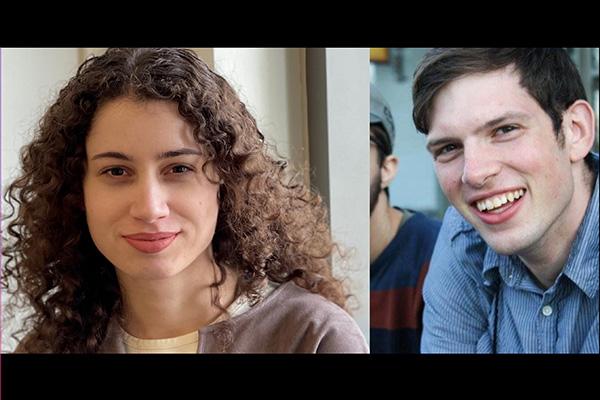Thomas Ellsworth and Mila Gajic, Research Accepted Into the Edward F. Hayes Advanced Research Forum

Thomas Ellsworth and Mila Gajic, third-year MFA candidates in Digital Animation and Interactive Media at Ohio State, have each been selected to present their research at the Hayes Advanced Research Forum. This forum showcases innovative research by graduate students, facilitating exchanges among students, scholars, faculty, and the public. Cash prizes, totaling more than $17,000, will be awarded for the top presentations in each academic area. The 38th Hayes Forum is scheduled for March 1, 2024, from 8:00 am to 3:30 pm.
Please join us in congratulating Thomas and Mila! Read more about their research below.
Green Acres: Endogenous Analog Game Design around a Real-World Problem
Thomas Ellsworth
MFA Digital Animation and Interactive Media, Spring 2024
Thesis abstract:
Thomas Ellsworth’s research explores designing an endogenous informational game about land management practices as part of an interdisciplinary team of faculty and student researchers. An endogenous informational game is an educational game where the learning is not driven by learning outcomes, though it is instead embedded in the narrative, mechanics, and theme of the game. This research is part of a larger interdisciplinary team project about using land management data, game design, and artificial intelligence to represent the impact of discrete choices on communal ecological wellbeing. Building land management knowledge into this analog game is a steppingstone to a future digital game where machine learning informs more complex and less visible data-to-real-world connections.
The research is based in iterative design (Salen and Zimmerman 2003), a cyclical process of creating prototypes and then playing the game (playtesting) as the primary form of feedback. Thomas is applying iterative design to an interdisciplinary design process where the game designers are not specialists in land management practices. Instead, he applies playtesting and participatory methods to engage with our stakeholders, faculty, and professionals in the field of land management. Thomas is using qualitative methods including journaling, observations, reflection-on-action, and coding to examine the design journey and learn about this design process.
The primary outcome of the project will be an analog game (board game) about land management practices, situated in northern Ohio & the western Lake Erie basin. This game will seek to inform a general audience about sustainability issues in current systems of agriculture and water management. The secondary output will be visual and written documentation of the design journey, exploring the design process of creating entertaining and informational games in this collaborative setting. Each of these outcomes will be exhibited and playtests of the final game will be evaluated for informational impact.
References : Salen, K., & Zimmerman, E. (2003). Rules of play. MIT Press Ltd.
Affordances of Immersive Virtual Spaces as a Medium for Representing an Inquiry Process
Mila Gajic
MFA Digital Animation and Interactive Media, Spring 2024
Thesis abstract:
In the realm of immersive media and 3D environments, presenting personal research often confines creators to two-dimensional formats. This can limit the depth of conveyed experiences and hinder the fresh ideation that can emerge through the presentation process. Leveraging the affordances of interactive virtual spaces could be the next step in sharing creative research. Mila Gajic is interested in how organizing conceptual inquiries into “navigable spatial diagrams” through experiential media can foster new insights through interactive engagement.
Using a research-through-design approach and the medium of mixed reality (virtual and augmented reality), Mila is exploring how 3D virtual worlds can uncover additional formats for presenting personal inquiries and sharing them with others. Mila’s project consists of immersive virtual spaces whose structures depict the core ideas, connections, and developments within her research interests over the past two years. To translate mostly abstract concepts into a spatial layout, she coded specific virtual elements like interactive properties of virtual objects and digital lighting with symbolic meanings linked to her practice. These spatial metaphors facilitate an interpretative space that balances authorial control and user agency in immersive media. Also, Mila explores ways of offering insights into her design process within the virtual world through spatial annotations that users can unveil gradually.
Rooted in Reflective Practice, this project merges methodologies of Human-Centered Design and Storytelling Design for Virtual Reality, which together emphasize user experience within immersive nonlinear narratives. It also employs Arts-Based Research practices in translating inquiries from non-spatial to spatial forms, while promoting transparency and aesthetic response in the research process. Beyond uncovering additional avenues for presenting personal research, the project addresses current gaps in the field of mixed reality, including text positioning in 3D spaces, authorial intention in relation to the user’s interpretation, and intensifying the sense of presence in virtual worlds.
